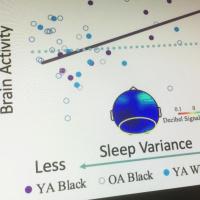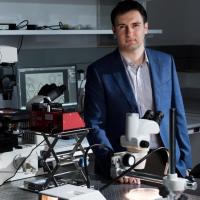In the year 2026, at rush hour, your self-driving car abruptly shuts down right where it blocks traffic. You climb out to see gridlock down every street in view, then a news alert on your watch tells you that hackers have paralyzed all Manhattan traffic by randomly stranding internet-connected cars. Flashback to July 2019, the dawn of autonomous…
A team of scientists from the University of South Florida, Florida Atlantic University, and Georgia Institute of Technology used NASA satellite observations to discover the largest bloom of macroalgae in the world, an event that blankets the surface of the tropical Atlantic Ocean from the west coast of Africa to the Gulf of Mexico. The belt of…
A new study has found that variability in night-to-night sleep time and reduced sleep quality adversely affect the ability of older adults to recall information about past events. The study also found unexpected racial differences in the type of sleep patterns tied to lower memory performance across both younger and older African American research…
A 5,000-year-old toy still enjoyed by kids today has inspired an inexpensive, hand-powered scientific tool that could not only impact how field biologists conduct their research but also allow high-school students and others with limited resources to realize their own state-of-the-art experiments. The device, a portable centrifuge for…
Modeling the complex electrical waves that cause heart arrhythmias could provide the key to understanding and treating a major cause of death in the world. Until now, however, real-time modeling of those deadly waveforms within millions of interacting heart cells required especially powerful computer clusters – even supercomputers. Using graphics…
Researchers have demonstrated an integrated technique for monitoring specific biomolecules – such as growth factors – that could indicate the health of living cell cultures produced for the burgeoning field of cell-based therapeutics. Using microfluidic technology to advance the preparation of samples from the chemically complex bioreactor…
Psssst, mud crabs, time to hide because blue crabs are coming to eat you! That’s the warning the prey get from the predators’ urine when it spikes with high concentrations of two chemicals, which researchers have identified in a new study. Beyond decoding crab-eat-crab alarm triggers, pinpointing these compounds for the first time opens new…
The American Association for the Advancement of Science (AAAS) has named three researchers from the Georgia Institute of Technology as fellows for 2017 for their contributions to the advancement of science.Baratunde Cola, Mary Frank Fox, and Joshua Weitz, who are members of AAAS, were elected by their peers to receive the honor and join hundreds…
Georgia Tech Research Corporation 80th Anniversary Awards November 21, 2017 A celebration of 80 years of the Georgia Tech Research Corporation (GTRC) took place Thursday, Nov. 2, at the Historic Academy of Medicine at Georgia Tech. The celebration was part of a meeting of GTRC's Board of Trustees and recognized innovators who are creating the…
The world human population is already more than 7 billion – a number that could exceed 11 billion by 2100, according to projections from the United Nations. This rising populace, coupled with environmental challenges, puts even greater pressure on already strained energy resources. Granted, there’s no silver bullet, but Georgia Tech researchers…

![<p>Actual gridlock in Manhattan in 2007.</p><p>Credit: Rgoogin at the English Wikipedia [CC BY-SA 3.0 (http://creativecommons.org/licenses/by-sa/3.0/)]</p>](/sites/default/files/styles/news_listing_image_block/public/news-images/New_York_City_Gridlock.jpg?h=9cc75f89&itok=T5ynC7-G)











